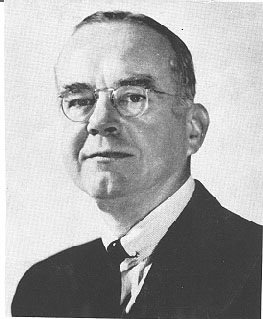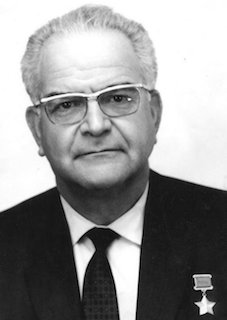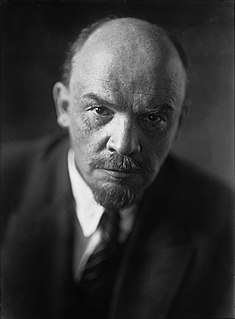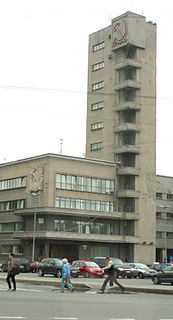
Lev Davidovich Bronstein, better known as Leon Trotsky, was a Russian-Ukrainian Marxist revolutionary, political theorist and politician. Ideologically a Marxist, his developments to the ideology are called Trotskyism.

Trotskyism is the political ideology and branch of Marxism developed by Russian revolutionary Leon Trotsky and some other members of the Left Opposition and Fourth International. Trotsky self-identified as an orthodox Marxist, a revolutionary Marxist, and Bolshevik–Leninist, a follower of Marx, Engels, and 3L: Vladimir Lenin, Karl Liebknecht, and Rosa Luxemburg. He supported founding a vanguard party of the proletariat, proletarian internationalism, and a dictatorship of the proletariat based on working-class self-emancipation and mass democracy. Trotskyists are critical of Stalinism as they oppose Joseph Stalin's theory of socialism in one country in favour of Trotsky's theory of permanent revolution. Trotskyists criticize the bureaucracy and anti-democratic current developed in the Soviet Union under Stalin.

The Fourth International (FI) is a revolutionary socialist international organization consisting of followers of Leon Trotsky, also known as Trotskyists, whose declared goal is the overthrowing of global capitalism and the establishment of world socialism via international revolution. The Fourth International was established in France in 1938, as Trotsky and his supporters, having been expelled from the Soviet Union, considered the Communist International as effectively puppets of Stalinism and thus incapable of leading the international working class to political power. Thus, Trotskyists founded their own competing Fourth International.

James Burnham was an American philosopher and political theorist. He chaired the philosophy department at New York University; His first book was An Introduction to Philosophical Analysis (1931). Burnham became a prominent Trotskyist activist in the 1930s. He later rejected Marxism and became an even more influential theorist of the right as a leader of the American conservative movement. His book The Managerial Revolution, published in 1941, speculated on the future of capitalism. Burnham was an editor and a regular contributor to William F. Buckley's conservative magazine National Review on a variety of topics. He rejected containment of the Soviet Union and called for the rollback of communism worldwide.

Jaime Ramón Mercader del Río, more commonly known as Ramón Mercader, was a Spanish communist and NKVD agent who assassinated Russian Bolshevik revolutionary Leon Trotsky in Mexico City in August 1940 with an ice axe. He served 19 years and 8 months in Mexican prisons for the murder.

Lenin's Testament is a document dictated by Vladimir Lenin in late 1922 and early 1923. In the testament, Lenin proposed changes to the structure of the Soviet governing bodies. Sensing his impending death, he also gave criticism of Bolshevik leaders Zinoviev, Kamenev, Trotsky, Bukharin, Pyatakov and Stalin. He warned of the possibility of a split developing in the party leadership between Trotsky and Stalin if proper measures were not taken to prevent it. In a post-script he also suggested Joseph Stalin be removed from his position as General Secretary of the Russian Communist Party's Central Committee.

The terms "red pill" and "blue pill" refer to a choice between the willingness to learn a potentially unsettling or life-changing truth by taking the red pill or remaining in contented ignorance with the blue pill. The terms refer to a scene in the 1999 film The Matrix.

Lady Cynthia Blanche Mosley, nicknamed "Cimmie", was a British politician of Anglo-American parentage and the first wife of the British Fascist, New Party, Labour and Conservative politician Sir Oswald Mosley. She was herself a Labour Member of Parliament.

Vadim Zakharovich Rogovin was a Russian Marxist (Trotskyist) historian and sociologist, Ph.D. in philosophy, Leading Researcher at the Institute of Sociology of the Russian Academy of Sciences, and the author of Was There An Alternative?, the 7-volume study of the Stalin era between 1923 and 1940, with an emphasis on the Trotskyist opposition.

Noi (Noah) Abramovich Trotsky was a Soviet architect.

Marxism is a method of socioeconomic analysis that originates in the works of 19th century German philosophers Karl Marx and Friedrich Engels. Marxism analyzes and critiques the development of class society and especially of capitalism as well as the role of class struggles in systemic, economic, social and political change. It frames capitalism through a paradigm of exploitation and analyzes class relations and social conflict using a materialist interpretation of historical development – materialist in the sense that the politics and ideas of an epoch are determined by the way in which material production is carried on.
The Spartacist League is a Trotskyist political grouping. They were the United States section of the International Communist League, formerly the International Spartacist Tendency. This Spartacist League named themselves after the original Spartacus League of Weimar Republic in Germany, but the this League has no formal descent from it. The League self-identifies as a "revolutionary communist" organization.

Centrism has a specific meaning within the Marxist movement, referring to a position between revolution and reformism. For instance, the Independent Social Democratic Party of Germany (USPD) and Independent Labour Party (ILP) were both seen as centrist because they oscillated between advocating reaching a socialist economy through reforms and advocating revolution. The parties that belonged to the so-called Two-and-a-half and Three-and-a-half Internationals, who could not choose between the reformism of the social democrat Second International and the revolutionary politics of the Communist Third International, were also exemplary of centrism in this sense. They included the Spanish Workers' Party of Marxist Unification (POUM), the Independent Labour Party (ILP) and Poale Zion.
In Trotskyist political theory, a degenerated workers' state is a dictatorship of the proletariat in which the working class' democratic control over the state has given way to control by a bureaucratic clique. The term was developed by Leon Trotsky in The Revolution Betrayed and in other works.
Anti-revisionism is a position within Marxism–Leninism which emerged in the 1950s in opposition to the reforms of Soviet leader Nikita Khrushchev. Where Khrushchev pursued an interpretation that differed from his predecessor Joseph Stalin, the anti-revisionists within the international communist movement remained dedicated to Stalin's ideological legacy and criticized the Soviet Union under Khrushchev and his successors as state capitalist and social imperialist.
Orthodox Trotskyism is a branch of Trotskyism which aims to adhere more closely to the philosophy, methods and positions of Leon Trotsky and the early Fourth International, Vladimir Lenin and Karl Marx than other avowed Trotskyists.

Permanent revolution is the strategy of a revolutionary class pursuing its own interests independently and without compromise or alliance with opposing sections of society. As a term within Marxist theory, it was first coined by Karl Marx and Friedrich Engels as early as 1850, but since then it has been used to refer to different concepts by different theorists, most notably Leon Trotsky.

The Permanent Revolution and Results and Prospects is a 1919 book published by Bolshevik-Soviet politician and former head of The Red Army Leon Trotsky. It was first published by the Left Opposition in the Russian language in Germany in 1930. The book was translated into English by John G. Wright and published by New Park Publications in 1931.
The Bloc of Oppositions, also known as Trotsky's bloc and called by the Soviet press the Bloc of Rights and Trotskyites, was a political alliance created by oppositionists in the USSR and Leon Trotsky by the end of 1932. Trotsky defined it as a conspiratorial bloc in order to fight Stalinist repression in the Soviet Union.











